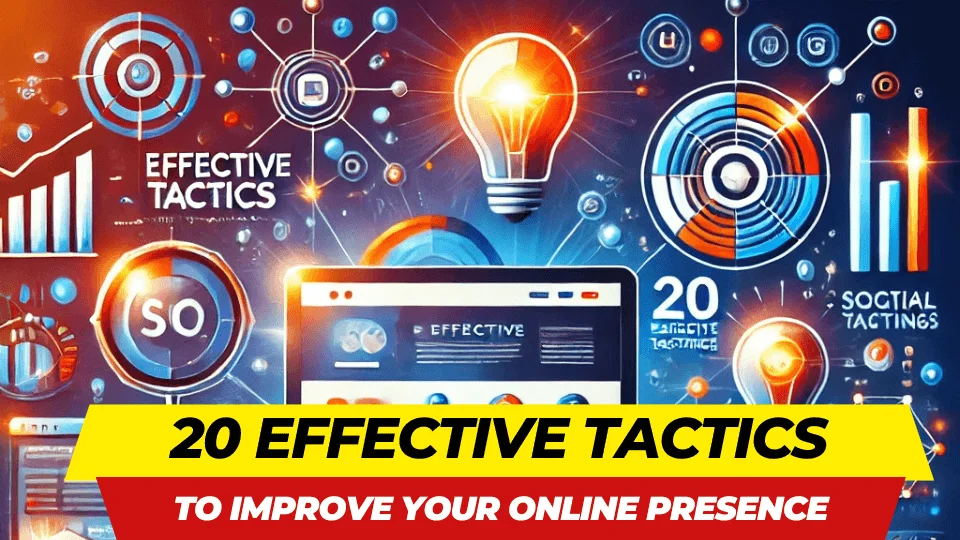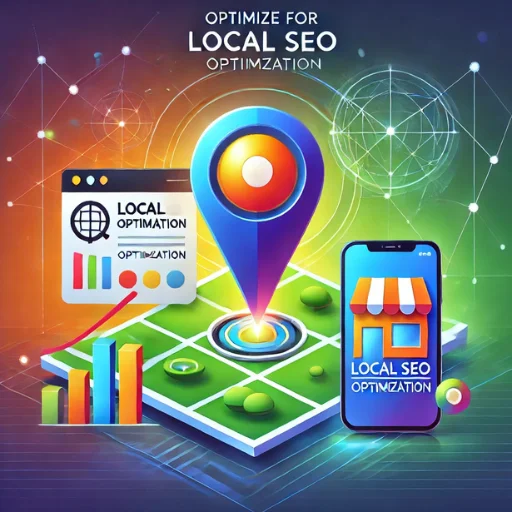20 Effective Tactics to Improve Your Online Presence

In today’s digital era, having a strong online presence is crucial for individuals and businesses alike. It helps build credibility, attract a wider audience, and foster meaningful connections. Whether you’re a small business owner, a freelancer, or a professional looking to enhance your visibility, implementing effective strategies can make all the difference. Here, we explore 20 proven tactics to improve your online presence and establish a lasting impact.
Introduction
Your online presence is the digital footprint you leave across the internet. It includes everything from your social media profiles and website to online reviews and search engine visibility. A robust online presence not only boosts brand awareness but also fosters trust among your audience. This guide delves into actionable tactics to help you thrive in the competitive digital landscape.
1. Build a Professional Website

The Foundation of Your Online Identity
A well-designed, user-friendly website serves as the cornerstone of your online presence. It should reflect your brand, provide valuable information, and be easy to navigate.
Key elements:
- Clear branding.
- Mobile responsiveness.
- SEO optimization.
2. Optimize for Search Engines (SEO)

Improve Visibility on Search Results
Search engine optimization (SEO) ensures your website ranks higher in search results. Use relevant keywords, optimize meta tags, and create high-quality content.
Why it matters:
- Increases organic traffic.
- Enhances user experience.
3. Leverage Social Media Platforms

Connect with Your Audience
Social media platforms like Instagram, Facebook, and LinkedIn allow you to engage directly with your audience. Share valuable content, run campaigns, and interact with followers.
Best practices:
- Post consistently.
- Use platform-specific strategies.
4. Create High-Quality Content

Inform, Engage, and Attract
Content is king in the digital world. Blogs, videos, and infographics can educate and entertain your audience while showcasing your expertise.
Tips for success:
- Focus on quality over quantity.
- Address audience pain points.
5. Utilize Email Marketing

Direct Communication
Email marketing helps nurture relationships with your audience. Send newsletters, promotional offers, and updates to keep them engaged.
Best practices:
- Personalize emails.
- Maintain a consistent schedule.
6. Invest in Paid Advertising

Amplify Your Reach
Platforms like Google Ads and social media ads can help you target specific demographics and boost visibility.
Why it’s effective:
- Provides measurable results.
- Targets specific audiences.
7. Engage with Online Communities

Build Trust and Authority
Participate in forums, social groups, and online communities related to your niche. Share insights and answer questions to establish yourself as an expert.
Examples:
- Reddit.
- Quora.
8. Monitor Online Reviews

Manage Your Reputation
Positive reviews build trust, while negative reviews provide opportunities for improvement. Respond to reviews professionally and promptly.
Pro tip:
- Encourage satisfied customers to leave reviews.
9. Collaborate with Influencers

Expand Your Reach
Partnering with influencers in your niche can introduce your brand to a broader audience.
How to choose:
- Look for genuine engagement.
- Align with your brand values.
10. Use Analytics to Measure Performance

Data-Driven Decisions
Tools like Google Analytics provide insights into website traffic, user behavior, and campaign performance.
What to track:
- Bounce rate.
- Conversion rates.
11. Optimize for Local SEO

Target Local Audiences
Local SEO helps you appear in searches related to your geographic area. Claim your Google My Business listing and encourage local reviews.
Why it matters:
- Attracts local customers.
- Improves foot traffic.
12. Embrace Video Marketing

Engage Visually
Videos are a powerful way to convey messages and engage audiences. Use platforms like YouTube and TikTok to share tutorials, testimonials, and behind-the-scenes content.
Pro tip:
- Keep videos concise and engaging.
13. Focus on Mobile Optimization

Enhance User Experience
Ensure your website and emails are mobile-friendly. A significant portion of internet traffic comes from mobile devices.
Checklist:
- Responsive design.
- Fast loading times.
14. Implement a Content Calendar

Stay Organized
A content calendar helps you plan and schedule posts, ensuring consistency across platforms.
Tools to use:
- Trello.
- Asana.
15. Incorporate Call-to-Actions (CTAs)

Drive Engagement
Encourage users to take specific actions, such as signing up for newsletters or making a purchase.
Effective CTAs:
- Use action-oriented language.
- Place them strategically.
16. Stay Updated with Trends

Adapt and Evolve
Keep up with the latest digital marketing trends to stay ahead of the competition.
How to stay informed:
- Follow industry blogs.
- Attend webinars and conferences.
17. Secure Your Online Presence

Build Trust
Implement security measures like HTTPS, strong passwords, and regular backups to protect your online assets.
Why it matters:
- Safeguards data.
- Builds credibility.
18. Host Webinars and Live Sessions

Engage in Real-Time
Webinars and live sessions allow you to connect directly with your audience, answer questions, and share expertise.
Platforms to use:
- Zoom.
- Facebook Live.
19. Network with Professionals

Build Relationships
Join professional groups and attend virtual or in-person networking events to expand your connections.
Benefits:
- Opens new opportunities.
- Builds credibility.
20. Maintain Consistency

The Key to Success
Consistency across all platforms reinforces your brand image and keeps your audience engaged.
Focus areas:
- Visual branding.
- Tone of voice.
FAQs About Improving Online Presence
How long does it take to see results from these tactics?
The timeline varies depending on the strategy. SEO and content marketing may take months, while paid ads can yield quicker results.
Do I need to be on every social media platform?
No, focus on platforms where your target audience is most active.
Is a website necessary for a strong online presence?
Yes, a website serves as your digital hub and adds credibility.
How can I manage my online reputation?
Monitor reviews, respond professionally, and encourage satisfied customers to leave positive feedback.
What tools can help improve my online presence?
Tools like Google Analytics, Hootsuite, and Canva can streamline your efforts and enhance results.
Conclusion
Improving your online presence is an ongoing process that requires dedication and strategy. By implementing these 20 tactics, you can enhance visibility, build credibility, and foster meaningful connections with your audience. Whether you’re just starting or looking to refine your approach, these strategies will set you on the path to digital success.






